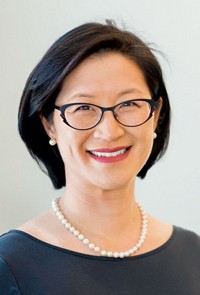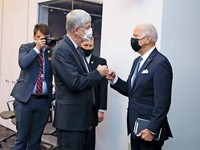Advertisement
Grab your lab coat. Let's get started
Welcome!
Welcome!
Create an account below to get 6 C&EN articles per month, receive newsletters and more - all free.
It seems this is your first time logging in online. Please enter the following information to continue.
As an ACS member you automatically get access to this site. All we need is few more details to create your reading experience.
Not you? Sign in with a different account.
Not you? Sign in with a different account.
ERROR 1
ERROR 1
ERROR 2
ERROR 2
ERROR 2
ERROR 2
ERROR 2
Password and Confirm password must match.
If you have an ACS member number, please enter it here so we can link this account to your membership. (optional)
ERROR 2
ACS values your privacy. By submitting your information, you are gaining access to C&EN and subscribing to our weekly newsletter. We use the information you provide to make your reading experience better, and we will never sell your data to third party members.
Diversity
Francis Collins says it’s time to end all-male panels. These prominent chemists responded
Collins, head of the NIH, says he will stop agreeing to speak on panels that lack diversity
by Bethany Halford, Laura Howes, Lisa Jarvis, and Megha Satyanarayana
June 14, 2019

On June 12, Francis Collins, the director of the US National Institutes of Health, released a statement that turned a few heads.
Collins declared that he would no longer be part of “manels,” a pop culture term critical of panel discussions and speaking engagements in which the participants are all white men. Collins said that he would commit to public speaking engagements only with “a level playing field, where scientists of all backgrounds are evaluated fairly for speaking opportunities.”
He then turned to Twitter, challenging other leaders to do the same.
C&EN reached out to more than two dozen prominent chemists and scientists in related fields to see what they thought of Collins’s declaration and subsequent challenge. About half responded, generally praising Collins’s move and sharing anecdotes of their institutional and personal efforts to increase diversity.
One researcher declined to comment, referring C&EN to his (female) department chair for comment. One said that he often requests that panels he serves on be diverse, but he cautions that it’s hard to nail down what that means and how to gauge when you’ve achieved it. And several reminded us that lists of female, nonwhite, and LGBTQ expertise are available and that conference organizers have as much responsibility as individuals in promoting that level playing field.

Here’s what some of these leaders had to say. Their comments have been edited for length and clarity.
Joanna Aizenberg, Harvard University, on an unintended consequence of efforts to diversify
Promoting diversity in academia and industry is extremely important, and the scientific community certainly stands to benefit from further diversifying the compositions of panels, councils, boards, and governing bodies of its institutions.
A typical unintended consequence of implementation of diversity-oriented policies is that women, who constitute a minority of physical sciences faculty in many universities, often carry a disproportionately high load of service on different committees and panels—exactly because they are asked to serve on almost every committee to improve its diversity composition.
The result is that these women are effectively put at a disadvantage compared to men, who carry a smaller load of such services and who can focus more of their time on doing their research, grant and paper writing, entrepreneurial activities, and other things that effectively give them a leg up in the competition.
Thomas Albrecht-Schmitt, Florida State University, on why diverse thinking matters
I agree with and support Collins on this issue.
On the most basic level, scientific problems need to be approached from multiple viewpoints. One can quickly point to the Manhattan Project that was able to accomplish its almost insurmountable goal only by bringing the finest minds from throughout the world together to solve a common problem. One of the best ways of ensuring that we are approaching scientific questions with as little bias and as much creativity as achievable is to build diverse communities of researchers that value different scientific viewpoints, support inclusiveness, and vocally oppose the monopolization of scientific resources by monolithic groups of people. There has been too much willful blindness by scientists on this and other critical issues.
Frances Arnold, Nobel laureate, California Institute of Technology, on the role of conference organizers in building diversity
I’m grateful that Collins recognizes the importance of diversity, but important organizations such as the Gordon Research Conferences (I am a trustee of the GRC) have promoted diversity for a long time.
Donna Blackmond, Scripps Research in California, on what self-assessment can reveal about diversity
Yes, I agree with Collins that this is an extremely important issue, and it is one that we are actively and enthusiastically addressing at Scripps. I started highlighting this issue a few years ago, when we were celebrating our 25th annual Frontiers in Chemistry Symposium—a fantastic event where we invite four speakers for an afternoon of top quality science. I looked back at the 25 years—so, 100 speakers total—and I realized that we had invited only FOUR women! We immediately took steps to address this and the next year invited two women and two men. We have been trying to keep this ratio ever since.
Craig Crews, Yale University, on how speaker diversity opens up career opportunities
I saw (and applaud) Collins’s announcement. I strongly support greater inclusion in speaker line-ups since it is important for both increased diversity of ideas and opinions and for more equitable opportunities for career advancement.
Chris Field, Stanford University, on why diversity in speakers is important to scientific practice
I support Collins’s call for a strong focus on diversity in speaking roles at high-profile and lower-profile events, from scientific meetings, to department seminars, to lab-group meetings. Personally, I have declined invitations to participate in manels, urging the organizers to use that slot to diversify the event. We have so much to gain from diversifying science that diversity needs to be a top-tier issue.
Robert Langer, Massachusetts Institute of Technology
I agree with the entirety of Collins’s statement.
Michael Mann, Pennsylvania State University
I applaud Collins. This is something I have been pushing back on myself. I have been refusing to serve on panels that consist entirely of white males.
Anne McNeil, University of Michigan, founder of Diversify Chemistry, on making sure diversity efforts don’t lead to tokenism
I liked how he phrased it, “where scientists of all backgrounds are evaluated fairly for speaking opportunities,” because that moves the conversation beyond identifying the “token” diversity speaker and calling it a day.
At the University of Michigan, our regular seminar series is quite diverse but we found that our named lectureships were not as diverse. Our Advance Program for faculty diversity collected the data and then shared it at a faculty meeting, and we made a commitment to pay attention to this issue when selecting speakers for our future lectureships.
Adrian Roitberg, University of Florida, on how he handles speaking requests
When I get an invitation that I’m interested in, I will agree conditionally, and ask that the organizers invite a diverse group of people. The big thing is including women, but organizers should also think beyond that to race or sexual orientation. I kind of hint that if they don’t, I won’t participate.
David Sedlak, University of California, Berkeley, on promoting diversity in speakerships outside the US
In Asia, diversity is often missing from panels and scientific programs due to the absence of women in senior leadership positions in the research community. Despite this limitation, I am not yet ready to decline invitations to speak in Asia when the program does not have the balance that we have come to expect elsewhere, because I am committed to enhancing communication within the international research community. In the environmental chemistry and engineering community, we have made efforts to advance the careers of the up-and-coming generation of women researchers in Asia by appointing them to editorial advisory boards and inviting them to give keynote lectures at conferences in North America.
Stuart Schreiber, Broad Institute of MIT and Harvard, on taking on Collins’s challenge
I would hope that many of our leaders have been adopting this policy on an informal basis, and achieving diversity of panels has become a consistent element of planning processes in my experience, but it’s helpful to see the NIH director declare his position so clearly.
It is embarrassing for all of us to see a panel lacking diversity and much more so to be a member of such a panel. Collins’s statement for me is a reminder to proactively determine proposed membership of panels before agreeing to join. I’d be happy to make this a formal personal policy.
Fraser Stoddart, Nobel laureate, Northwestern University, on refusing a speaking invite
I wouldn’t go as far as to refuse to speak in a situation where a panel turns out to be men only. I don’t think you need to be as aggressive as that. By turning up and speaking rather politely to the organizers to say, “This is really not acceptable,” I can be more influential rather than saying, “I’m just not coming.”
Jonathan Sweedler, University of Illinois Urbana-Champaign, on his own personal reckoning with diversity on panels
The move by Collins is both timely and welcome. I have been on all-male panels previously (full disclosure: I had not even paid attention to the names or gender of the other invited members of the panel when accepting the invitation); at the event, I rightfully have been called out on the issue. Rather than blame the organizers, it is better to take Collins’s approach and not participate. Collins has the stature to help change our culture and I plan to follow his lead.
Paul Weiss, University of California, Los Angeles, on being an active participant in ensuring diversity
I agree with this sentiment and take a more active role than Collins by suggesting relevant speakers and panelists to the organizers of meetings that lack diversity.
John Yates, Scripps Research in California, on setting goals for diversity in organizing panels
When I organize a conference session or a meeting I make sure I have a good balance of invited speakers across genders and other forms of diversity. I shoot for equal representation of men and women. I would make the same commitment for panels.
Lesley Yellowlees, University of Edinburgh, on society’s responsibility to build diversity
If you look at the statistics, there are too many instances of all-male panels and keynotes that do not reflect society or the audience in the room. I applaud Collins for saying this and I thank him for saying it. This is not a women’s problem, this is not a minorities’ problem, it is society’s problem and it needs senior leaders to step up like this.




Join the conversation
Contact the reporter
Submit a Letter to the Editor for publication
Engage with us on Twitter